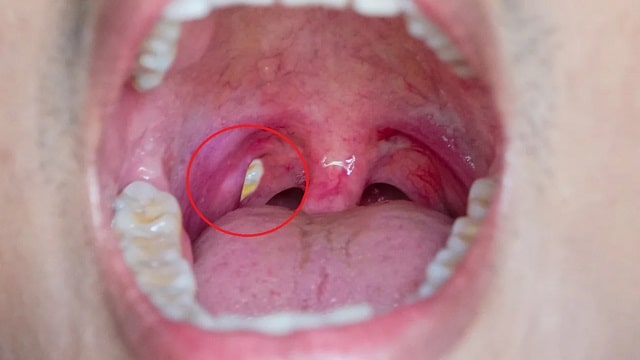Tonsil stones or tonsilloliths are small lumps that form on the tonsils. If left untreated, this condition can cause the sufferer to experience bad breath and a sore throat.
For mild conditions, this disease can be treated by gargling with salt water. However, if this condition has worsened, this disease needs to be treated with surgery.
Tonsil Stone Symptoms
In the early stages of its development, this disease will not cause any symptoms. However, as the stone grows larger, there are various symptoms that can be experienced, such as:
- Bad breath
The main symptom of this disease is quite bad breath. This will be worse if you have tonsil infection.
- Sore throat
This disease can cause sufferers to feel an uncomfortable sensation in the throat. Usually, this will be accompanied by a sore throat.
- Cough
If you have a cough that doesn’t get better, you should be aware of this condition. Tonsil stones cause irritation to the throat which causes the sufferer to cough.
- Presence of White Lumps
This condition also causes the appearance of white bumps that can be seen when you open your mouth wide.
- Difficulty Swallowing
As tonsil stones grow larger, sufferers may experience difficulty swallowing.
- Earache
Disorders of the tonsils can trigger certain nerves, causing earache.
- Tonsil Swelling
When stones form and enlarge, they can also cause swelling of the tonsils.
The various symptoms above will be very disturbing and cause discomfort.
Causes of Tonsil Stones
This disease occurs due to the presence of biofilm or a collection of microorganisms in the mouth. Biofilm is a combination of bacteria and fungi that are in the mouth and interact with the chemical fluids in the mouth.
In the case of tonsil stones, the mixture builds up and hardens on the tonsils.
Tonsil Stones Risk Factors
There are various conditions that can trigger the buildup of biofilm on the tonsils, such as:
- Poor oral and dental hygiene.
- Inflammation of the tonsils.
- Enlarged tonsils.
Tonsil Stone Diagnosis
A physical examination can be done to confirm this disease. If the complaints or symptoms are suspected of this disease, the doctor can also perform other examinations, such as a CT scan or MRI of the tonsils.
Tonsil Stone Treatment
If the size is still very small, tonsil stones generally do not require any treatment. However, if the size is getting bigger and causing uncomfortable health complaints, of course this condition needs to be treated properly.
Some treatments that can be done to treat this disease are:
- Using antibiotic drugs.
- Surgical procedure to remove tonsil stones.
If the size is still very small, you can try to treat this condition in other ways, such as gargling with salt water.
Tonsil Stone Complications
Tonsil stones are generally not a dangerous disease. However, this condition can cause discomfort especially if the size has become very large.
If the size has grown, then this condition can cause tissue damage and swelling of the tonsils. Not only that, this condition also risks causing tonsil infections.
Tonsil Stone Prevention
This disease is not contagious. However, you need to do various preventions to avoid this condition. Here are the preventions you can do:
- Maintain oral and dental hygiene.
- Clean your tongue after brushing your teeth.
- Quit smoking.
- Gargle regularly.
- Drink lots of water to keep your mouth from drying out.

